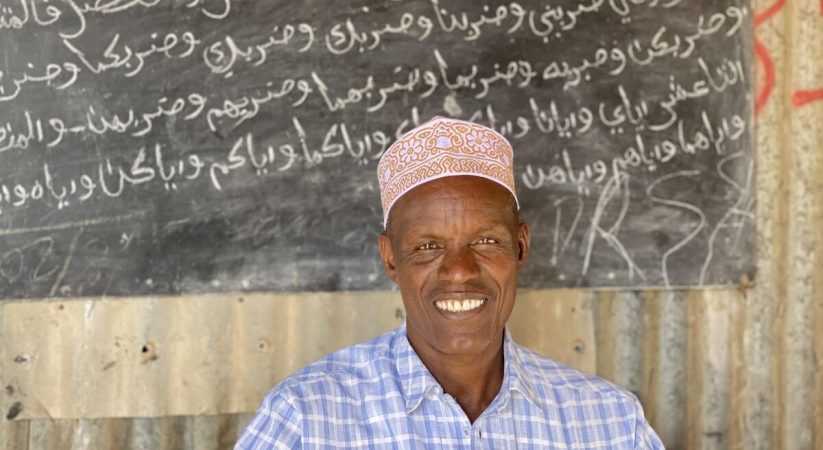
Bosaso – Somalia has around 2.9 million internally displaced people (IDPs). Their opportunities for a normal life have been disrupted by being forced to move due to conflict and climate change.
Of these, some 300,000 are estimated to be school-age children. For them, the displacement also means a disruption to their chance at an education.
In the northern city of Bosaso, Ali Abdirahman Abdulle is doing what he can to bring an end to that disruption.
“It’s concerning that many children who could lead this nation are unschooled,” the 56-year-old grassroots-level educator says.
Mr. Abdulle runs the Hayatul Islam School at the Ajuran IDP camp, located on the eastern corner of the coastal city, which has ten IDP settlements within its boundaries.
He is determined to make a difference, with his passion partly stemming from his own experience as an IDP.
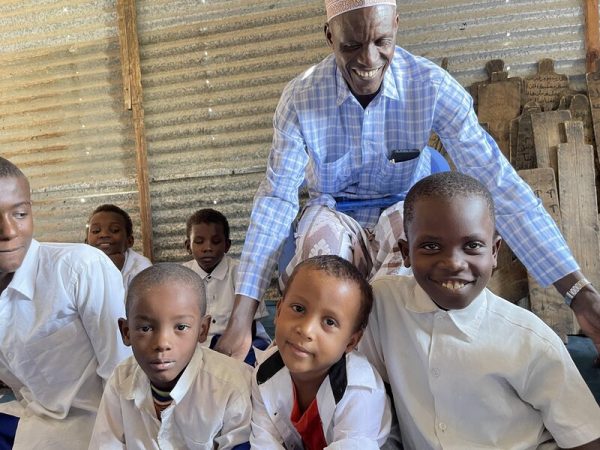
From farm to IDP camp
Hailing from a farming family in the Wanlaweyn district in the Lower Shabelle region of Somalia’s South West State, Mr. Abdulle was born in 1967.
His family’s circumstances led to him leaving primary school early as he needed to help provide for his family. Nonetheless, he was able to learn how to read and write thanks to Somalia’s acclaimed mass literacy campaign in 1974–75. During this time, secondary schools were closed, and students and volunteers were sent to rural areas to teach people how to read.
In 2005, the civil war in Somalia led him to flee South West State to Puntland, in the country’s north, where he and his family still live in the Hamarwayne IDP camp, located near the Ajuran IDP camp.
In 2018, seeing the number of young children missing out on school due to their circumstances as IDPs, he decided to act on some ideas that he had been considering.
“I could not stand idly by while numerous Somali youngsters, including my own children, were growing up without receiving an education. When I realised the persistence of this challenging situation, I devised a plan to assist children in acquiring at least the basics of an education,” Mr. Abdulle says.
“I decided to start from scratch, so I built the school and sought volunteer teachers to help me provide basic education for 130 pupils – including in social studies, mathematics, English and the Quran,” he adds. “I asked the displaced community members who had teaching experience to step forward and assist me in maximising the potential of these youngsters.”
His efforts culminated in the establishment that same year of the Hayatul Islam School, for which Mr. Abdulle serves as manager and teaches religious studies.
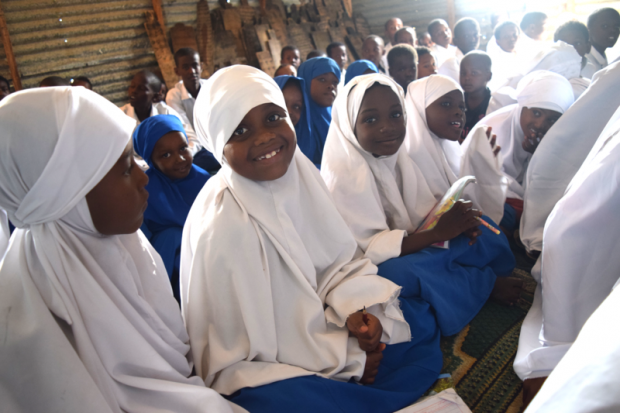
The challenge of poverty
Staffed by three teachers in a ramshackle building, the Hayatul Islam School currently provides classes covering standard subjects for grades one to four in the mornings and religious instruction in the afternoons, to 130 children, of whom 40 are girls.
While progress has been made, with enrolment having risen over the past five years, it has not been easy, primarily due to the limited financial resources common to IDPs.
“It is very challenging for us to continue the education of these children,” Mr. Abdulle says. “The most important phase of education, despite being burdensome to most parents, is primary school. The families of children in Bosaso city pay $10 to $20 per month for private and government-run elementary schooling. A displaced person cannot find that kind of money, making it difficult for their children to pursue opportunities for a future like that of other children.”
Because of this, most of the 130 students at the Hayatul Islam school are enrolled for free, and the few families who can afford to pay are asked to contribute $3 each month to help cover the school’s low operating costs.
Ensuring attendance
Mr. Abdulle’s own five children, aged between seven and 16, also attend the school, and he is diligent in ensuring their attendance and that of others, despite the challenges.
“I don’t let my kids or the other kids in the IDP camp miss school,” he says. “Some children still miss classes for other reasons, including those who help their parents meet their basic needs. I believe education is not a priority for the families at IDP centres because they struggle for survival.”
Knowing that, and having been in a similar situation, the education activist takes things a step further by going to the homes of students to encourage their parents to ensure they are able to go to school.
“I strongly encourage parents to send their children to school. I try to convince them that their financial difficulties should not prevent their children from attending school,” he says.
The IDP school receives support from a few local community members in Bosaso, and, of late, Mr. Abdulle has been considering expanding the initiative to other locations. He has reached out to government and humanitarian agencies to seek support.
“I am also going to seek assistance from Puntland’s Ministry of Education to provide free education to children in internally displaced camps,” Mr. Abdulle says.
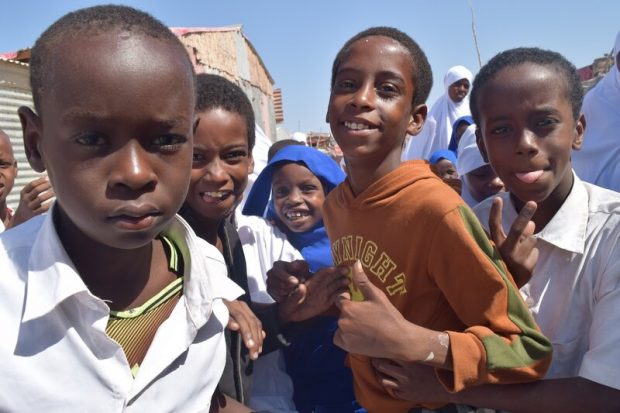
Education and human rights
The United Nations in Somalia strongly advocates for increased funding of its education sector to ensure education is accessible to all communities.
The United Nations is also heavily engaged in supporting the achievement of the Sustainable Development Goals (SDGs). The fourth SDG is centred on education, with the premise being that when people are able to get quality education they can break from the cycle of poverty, thus reducing inequalities, enabling upward socioeconomic mobility and helping to reach gender equality.
Part of the 2030 Agenda for Sustainable Development, the SDGs are a universal call to action to end poverty, protect the planet and improve the lives and prospects of everyone everywhere, and were adopted by all UN Member States in 2015 as part of the 2030 Agenda, which sets out a 15-year plan to achieve the SDGs.
In addition, education is a human right, according to the 1948 Universal Declaration of Human Rights (UDHR), which is the foundational document for much of the world’s human rights developments.
“Education shall be directed to the full development of the human personality and to the strengthening of respect for human rights and fundamental freedoms. It will advance the UN’s efforts to maintain peace by fostering mutual respect, tolerance, and friendship among all nations, regardless of race or religious affiliation,” the UDHR states.
One of the six guiding principles in the segment on education within the Five-Year Puntland Development Plan for 2020-2024 is that of access, which is defined as the ability of every learner to have equal opportunity to access education, regardless of their social class, age, gender, race, ethnic background, or disability. This principle aligns with the values of the UDHR, which emphasizes the importance of equal rights and non-discrimination for all individuals, including in the realm of education.
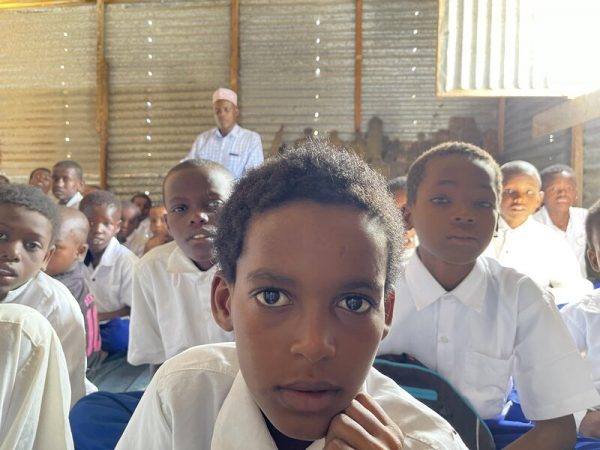
________________________________________________________
Qaranimo Online
Sources: UNSOM
_____________________________________________________________________________________Xafiiska Wararka Qaranimo Online | Mogadishu, Somalia
_____________________________________________________________________________________Advertisement
_____________________________________________________________________________________


